As the clock ticks closer to striking Congress’ deadline to pass the “big, beautiful bill,” there’s one policy point that’s largely gone overlooked: the Inflation Reduction Act (IRA) and its green energy subsidies.
“There is debate over how much… you cut? Do you cut most of it? Do you cut none of it? Do you cut some of it?” Independent Women’s Forum Center for Energy and Conservation Director Gabriella Hoffman told Fox News Digital.
“To ensure that the president can see his energy agenda unleashed… there could be far more cuts made,” she continued. “[If not] the economic and energy consequences would be pretty dire.”
Former President Joe Biden signed the IRA into law in August 2022, which included eight major energy subsidies for green initiatives like solar and wind power, electric vehicles, home energy improvements and more.
LEAVITT DETAILS HOW TRUMP’S BUDGET BILL WOULD CODIFY NEW PARENTS’ SAVING ACCOUNTS: ‘401K FOR A NEWBORN BABY’
“We were told and promised that clean energy adoption will be spurred and expedited with these subsidies. It’s failed to deliver on that promise as well,” Hoffman criticized.
“That is the unfortunate clarion call that a lot of us have to deliver,” she expanded. “Subsidies pop up unsustainable, uncompetitive businesses, usually at the expense of smaller, medium-sized ones.”
House Republicans are currently split as some lawmakers want the subsidies fully repealed, and others want some credits to remain intact – all while working on a massive piece of legislation advancing President Donald Trump’s agenda on taxes, border security, national defense and also raising the debt limit.
Hoffman urges Republicans to repeal the IRA subsidies in their entirety, citing a recent nonpartisan report from The Cato Institute that the subsidies could cost taxpayers $4.7 trillion by 2050, but would save $1 trillion if acted on during this reconciliation period.
“With the nature of green subsidies, the government is going to be awarding and can issue these tax credits with no limits because there’s no deadline or expiration or termination set to this,” Hoffman explained. “The government is going to spend more in perpetuity… That is why you’re seeing this ballooning of costs well above the projected estimates from 2022, and it’s going to continue to spiral up.”
“Taxpayers are going to feel the brunt of these green subsidies if they’re not repealed,” the energy expert added, also noting that the IRA has produced “negligible” results in job creation and intended emissions reductions.
“At best, [the New Green Deal is] only going to reduce emissions by 0.2 degrees Celsius and have about $7 trillion in economic destruction, and about a million jobs displaced from the workforce,” Hoffman said. “A pretty low return on investment or a pretty big economic toll, so that is what we can anticipate.”
Budget reconciliation is the “ideal” time to act, according to Hoffman, as it will only become more difficult down the road with a potential partisan shakeup in the 2026 midterm elections.
“This process is the perfect time to repeal green subsidies and perhaps recoup those monies, potentially a trillion dollars, to fund other priorities like making tax cuts permanent and seeing those monies go to better use,” she said.
Thirty-eight House Republicans have signed off on their support for the full repeal of IRA subsidies. But, top GOP leaders like Sen. Shelley Moore Capito and Sen. Kevin Cramer say the pitch goes too far and could harm the deployment of other new energy technologies.
“The economic and energy consequences would be pretty dire. So, of course, taxpayers are going to feel the brunt of these green subsidies if they’re not repealed. That is the unfortunate clarion call that a lot of us have to deliver.”
Last week, Moore Capito told Politico: “I would expect that to change… there has been job creation around these tax credits.”
“I think that’s [the] wrong thinking,” Hoffman rebutted. “These jobs are never guaranteed. If the government is incentivizing job creation and business creation, there are strings attached, and because of market conditions, they could ultimately unfold and break down and not come to fruition.”
“The government picking winners and losers never works. It artificially inflates the appearance of businesses doing well… it ruins the potential for innovation, it ruins the potential for unleashing the free market in this space,” she further cautioned.
“Energy abundance, to be accomplished, has to be not subjected to the whims of the government. We are at risk of falling behind on energy demands, falling behind our competitors and adversaries, China and Russia… It really dooms our future to being an energy powerhouse.”
READ MORE FROM FOX BUSINESS
Fox News’ Elizabeth Elkind contributed to this report.



